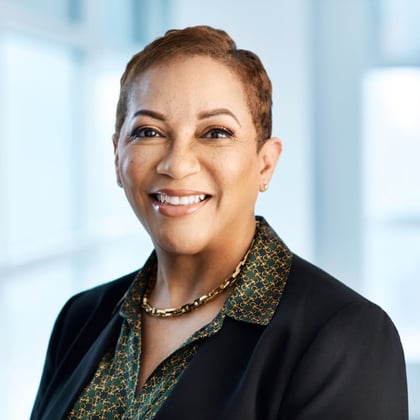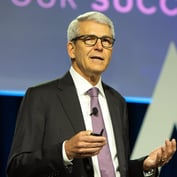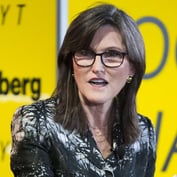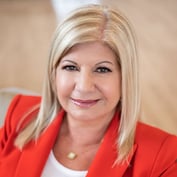“The representation of someone who looks like you is literally the embodiment of possibility,” says Tonia Bottoms, a managing director and senior managing counsel for BNY Mellon’s Pershing, in an interview with ThinkAdvisor.
She was talking about the ways in which financial services can become a more racially diverse and inclusive industry.
“While financial services has done a good job of approaching gender diversity issues, we still have a lot of work to do on ethnic diversity issues,” says Bottoms, a diversity and inclusion advocate for her firm.
By her presence and word, the attorney, who is Black, has “an opportunity to help drive change,” as she frames it.
Participating in BNY Mellon’s initiatives and strategies, Bottoms and her perspective — indeed, her voice — get attention.
“Is an action we’re talking about really going to address the intention that we’re trying to solve for?” she cites as an example.
Bottoms’ influence is also felt in her role as a diversity and inclusion public speaker.
In the interview, she discusses barriers to entering the financial services industry that clearly impede the effort to advance diversity.
Consistently focusing on raising awareness about opportunities will help attract more diverse individuals, she stresses.
“It all goes back to increasing representation” among “Blacks, Latinx, Asians, women, LGBTQ,” she says.
Boosting the number of female financial advisors across the industry is obviously a good thing for firms and clients alike.
In fact, 29% of women under 30 who already invest said that having a female advisor “would influence them to invest more.”
That’s among the findings of a 2021 BNY Mellon study, “The Pathway to Inclusive Investment: How Increasing Women’s Participation Can Change the World.”
Further, as Bottoms points out, “It’s important to see women in more prominent roles as leaders in financial services.”
Her company’s senior leadership team is “fairly gender diverse,” she says. But ethnic diversity is “a place where we have an opportunity to do better.”
Still, the firm won two 2021 ThinkAdvisor LUMINARIES industry recognition awards for thought leadership and education in the area of diversity and inclusion.
In her capacity as a lawyer, Bottoms addresses all aspects of Pershing’s retirement business and delivers guidance about the oversight of retirement and education savings products.
Before joining the firm in 2010, she was senior counsel at Bank of America Merrill Lynch for 11 years.
ThinkAdvisor recently held a phone interview with Bottoms, who was speaking from Jersey City, New Jersey, where Pershing is based.
She talked about obstacles she herself has faced professionally because of her gender and race and the opportunities that have accompanied them.
Offering an optimistic forecast for the expansion of diversity and inclusion industry-wide, Bottoms sees heightened, action-oriented progress by “making sure that what we say is then backed up and demonstrated in what we do.”
Here are excerpts from our interview:
THINKADVISOR: Why does the financial services industry struggle so with diversity and inclusion, especially with diversity among financial advisors?
TONIA BOTTOMS: While financial services has done a good job of approaching gender diversity issues, we still have a lot of work to do on ethnic diversity issues.
Some of these relate to representation — being able to see yourself as having an opportunity.
What exactly is the “work” that you say needs to be done?
As an industry, we really need to do a better job of explaining [the opportunities] to people who might be interested: talent that’s already in the industry, people coming out of school looking for opportunity.
There are many different ways you can work in financial services.
Is this largely a matter of consciousness raising?
Raising consciousness helps the industry lay out the framing for why we think financial services should be attracting more diversity and why it’s important.
It all goes back to increasing representation so there are active examples of diverse leaders in different places.
We need to have that because financial services serves a broad population. It’s really important that our industry reflects the community that we serve and that people see choice and opportunity for growth.
What are the barriers to entry?
There [can be] barriers that relate to the ability to have access to training or access to the technology that supports the training.
There are steps that we can take as an industry that might go that extra mile and not just say, “We need people working [in it].”
We need to figure out how to support more people who can move forward and have access [including] being able to attend school or take a class.
But why aren’t racially diverse people more attracted to working in financial services? Do they think the industry has a bad reputation because of gender discrimination and sexual harassment lawsuits or the “Wolf of Wall Street” movie, or TV series that depict bad apples in financial services?
Certainly having awareness about the broad scope of the industry [implies] great opportunity. [Financial services] is not necessarily what you see in a movie or on a television show.
Awareness is key. And having diverse individuals — Black, Latinx, Asian, women, LGBTQ — who have representation, people who look like [potential candidates], is a huge component.
The representation of someone who looks like you is literally the embodiment of possibility.
Why do you think more women aren’t attracted to working in financial services?
There are some factors that intersect: Women have a lot of obligations in the home, to family and in the community.
But that’s not the only issue. It’s important to see women as leaders in more prominent roles in financial services.
What else is needed to raise the proportion of women in the industry?
A huge piece is how companies [establish] a culture that creates opportunity for everyone and where people of [a variety of] needs can thrive.
How do you do that with flexibility? In the pandemic, when everyone was, kind of, forced to be at home, we saw how we could be productive and how that environment offered flexibility and balance for [both] men and women.
Part of your job is as BNY Mellon’s Pershing diversity and inclusion advocate. How do you advocate as the voice for this both within the firm and externally?
I’m able to influence with my presence. I have the ability to advocate from the perspective of being engaged in leading and engaged in dialogue about how we’re going to approach initiatives and strategies.









 June 06, 2022 at 06:04 PM
June 06, 2022 at 06:04 PM











